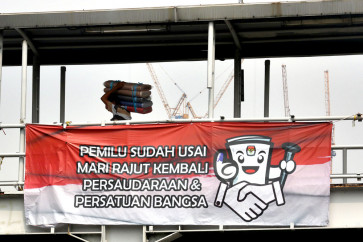Popular Reads
Top Results
Can't find what you're looking for?
View all search resultsPopular Reads
Top Results
Can't find what you're looking for?
View all search resultsElections: Upcoming challenges of identity politics
Change text size
Gift Premium Articles
to Anyone
I
ndonesian President Joko “Jokowi” Widodo is on course for a second term in office; quick counts of the April 17 ballots suggest that he won around 55 percent of the votes, while his long-time rival, former military strongman Prabowo Subianto, garnered some 44 percent.
This result is more or less similar to the 2014 presidential elections when Jokowi secured 53.15 percent of the valid votes, according to the General Elections Commission (KPU).
One question that arose from the recent elections is: What are the future challenges faced by the president-elect in dealing with the ubiquitous rise of identity politics that promotes the “holier than thou” narrative among disgruntled members of the Prabowo camp, as well as of those with differing concepts of national interests?
Identity politics here refers to political positions that are based on the interests and perspectives of ethnic, social or cultural groups; in the context of today’s Indonesian electoral politics, it refers to specific practices and traditions of Islam with which people identify.
If identity politics is not well-managed, it may lead to a frustrated and fractious society that would, in the long run, hinder the country from overcoming its deep-rooted and acute internal and external problems, including abject poverty, inequality, radicalism and environmental degradation.
That said, identity politics is not new in Indonesia. It has been part and parcel of political contests in the country since independence. However, and more significantly, it is not uniquely Indonesian.
Think of the rise of Donald Trump in the United States or Brexit in the United Kingdom. Perhaps, Indonesian (and maybe Asian) politicians learned from the West that identity politics that promotes fear of “the other” and hateful sentiments, exacerbated by the rise of social media and online falsehoods, have successfully put its advocates into power.


















